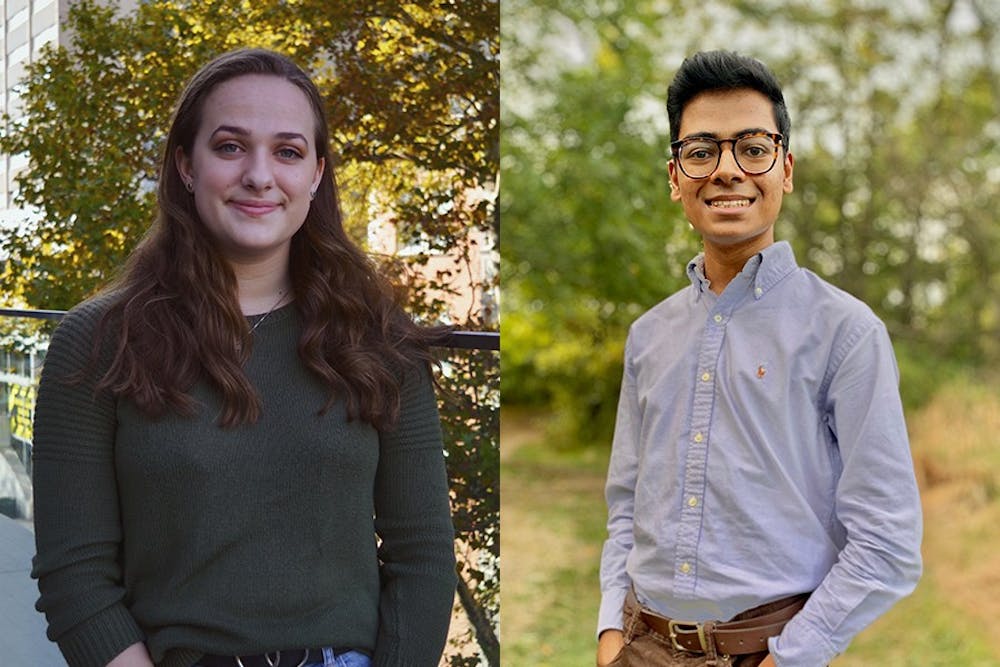
Tori Borlase (left) and Nikhil Gupta (right) spoke at the final Undergraduate Assembly presidential debate on Apr. 13. (Photo of by Sally Chen and photo from Nikhil Gupta)
Undergraduate Assembly presidential and vice presidential candidates made their case to potential voters at the first of two debates Sunday night.
College junior and UA Academic Initiatives Director Tori Borlase and College and Wharton junior and UA Treasurer Nikhil Gupta, both of whom are running for president, answered questions about their qualifications and platforms at the debate, which was moderated by College senior and Nominations and Elections Committee Vice Chair for Education Omar Bakri. Sunday's debate precedes the voting period, which will run from April 12 to April 14.
Borlase touted her experience working with student groups on UA projects in the past, including the Student Sustainability Association at Penn, which has endorsed Borlase and her running mate, College and Wharton junior Janice Owusu. Borlase organized a Climate Seminar with SSAP and the Faculty Senate earlier this month, during which students and faculty questioned administrators about Penn's climate policies.
She emphasized her ability to work with student groups, understand their concerns, and bring them to the administration.
“My rule of thumb is always to listen in meetings with students and to speak up in meetings with administrators,” Borlase said at the debate.
Gupta also focused on his experience working with, and advocating on behalf of, student groups as treasurer. Gupta previously led a UA collaboration in October 2019 with the Penn Association for Gender Equity to distribute free menstrual products in bathrooms on campus.
“Our main focus is on advancing the goals of other groups, and that comes with not only bringing up those concerns in our meetings, but also encouraging administrators to meet with those groups directly,” Gupta said at the debate.
Under Gupta's leadership as treasurer, the budget for the six branches of Penn Student Government did not increase as it normally does, leaving the six branches of PSG with less room to make funding requests. The budget funds student groups through the Student Activities Council, as well as other branches of PSG, including the Social Planning and Events Committee and the Student Committee on Undergraduate Education. Gupta said the lack of a budget increase required negotiation and collaboration between branches of student government to ensure a fair allocation of the limited funds.
Both candidates said they want to continue to push for the 6B, a coalition of groups representing students from marginalized backgrounds, to have cultural houses on Locust Walk, a goal that has been a priority of the 6B for years.
Gupta highlighted his shared platform with his running mate for UA vice president, College sophomore Gaby Montes, which includes addressing student needs through, for example, more gender-neutral bathrooms on campus. Their platform also prioritizes greater representation of racially diverse and LGBTQ professors and Counseling and Psychological Services staff.
“I'm responsive to the needs of others, and I'm ready to take my experience doing specific initiatives and apply it to the broader goal of supporting other UA members who tackle the plethora of work that needs to be done,” Gupta said.
He said that he also wants to prioritize student wellness, particularly through expanding CAPS' Let’s Talk campaign, which brings CAPS clinicians to sites on campus. He noted that holding Penn accountable, including urging the University to pay Payments In Lieu of Taxes to Philadelphia, is also central to his platform.
Gupta added that his first priority as UA president would be instituting Penn Violence Prevention training for student groups on how to prevent and address interpersonal violence as groups return to in-person activities.
Borlase’s platform also prioritizes equity and inclusion through retaining faculty members of color and securing meetings with administration for groups that are part of the 6B. Borlase also highlighted wellness in her platform, particularly through more racially diverse CAPS therapists and psychiatrists. Supporting students during the transition back to in-person academics will be key to her platform, she said.
One hour before the presidential debate, Bakri moderated a debate between vice-presidential candidates Owusu, who is running with Borlase, and Montes, Gupta’s running mate.
Montes, who is currently the Reopening and Response UA committee director, touted her work both internally on the UA and with student groups. Montes said that her work connecting UA members and student groups with administration has prepared her for the responsibilities of UA vice president. The UA vice president leads UA Steering, a committee with representatives from more than 40 student groups.
Montes said she wants to ensure effective collaboration among UA members as they take on individual projects, as well as between the UA and student groups.
“One of our main focuses for our platform is making sure that we uplift the work and amplify the voices of student groups without co-opting,” Montes said.
Owusu said her main priority on the UA will be centralizing the concerns of student groups by adding more groups to UA Steering and creating working groups within the body. She hopes this policy will eliminate overlap in UA and student group projects, allowing them to work together on shared goals rather than separately.
Owusu also cited her experience as a three-year UA member and as UA speaker this past year.
“That’s given me a lot of relationships with [administration]. They all know my face, but they also know that I'm the person that will push back against them,” Owusu said.
The second and final presidential debate will take place over Zoom on Tuesday at 7 p.m. The voting period will close at 5 p.m. on Wednesday.
The Daily Pennsylvanian is an independent, student-run newspaper. Please consider making a donation to support the coverage that shapes the University. Your generosity ensures a future of strong journalism at Penn.
Donate



